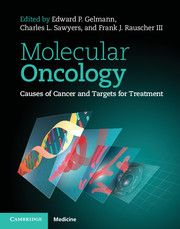Book contents
- Frontmatter
- Dedication
- Contents
- List of Contributors
- Preface
- Part 1.1 Analytical techniques: analysis of DNA
- Part 1.2 Analytical techniques: analysis of RNA
- Part 2.1 Molecular pathways underlying carcinogenesis: signal transduction
- Part 2.2 Molecular pathways underlying carcinogenesis: apoptosis
- Part 2.3 Molecular pathways underlying carcinogenesis: nuclear receptors
- Part 2.4 Molecular pathways underlying carcinogenesis: DNA repair
- Part 2.5 Molecular pathways underlying carcinogenesis: cell cycle
- Part 2.6 Molecular pathways underlying carcinogenesis: other pathways
- Part 3.1 Molecular pathology: carcinomas
- Part 3.2 Molecular pathology: cancers of the nervous system
- Part 3.3 Molecular pathology: cancers of the skin
- Part 3.4 Molecular pathology: endocrine cancers
- Part 3.5 Molecular pathology: adult sarcomas
- Part 3.6 Molecular pathology: lymphoma and leukemia
- Part 3.7 Molecular pathology: pediatric solid tumors
- Part 4 Pharmacologic targeting of oncogenic pathways
- 78 Oncology drug discovery for biologics: antibody development strategies and considerations
- 79 Targeting the EGFR family of receptor tyrosine kinases
- 80 Therapeutic approaches with antibodies to cell-surface receptors
- 81 Signal transduction in tumor angiogenesis
- 82 Tyrosine-kinase inhibitors in oncology
- 83 Anti-estrogens and selective estrogen-receptor modulators
- 84 Therapeutic applications of anti-sense mechanisms for the treatment of cancer
- 85 Induction of apoptosis
- 86 DNA-methylation inhibitors
- 87 Histone deacetylase inhibitors
- 88 Drug resistance: as complex and diverse as the disease itself
- 89 Molecular profiling and therapeutic decision-making: the promise of personalized medicine
- 90 DNA repair inhibition in anti-cancer therapeutics
- Index
- References
86 - DNA-methylation inhibitors
from Part 4 - Pharmacologic targeting of oncogenic pathways
Published online by Cambridge University Press: 05 February 2015
- Frontmatter
- Dedication
- Contents
- List of Contributors
- Preface
- Part 1.1 Analytical techniques: analysis of DNA
- Part 1.2 Analytical techniques: analysis of RNA
- Part 2.1 Molecular pathways underlying carcinogenesis: signal transduction
- Part 2.2 Molecular pathways underlying carcinogenesis: apoptosis
- Part 2.3 Molecular pathways underlying carcinogenesis: nuclear receptors
- Part 2.4 Molecular pathways underlying carcinogenesis: DNA repair
- Part 2.5 Molecular pathways underlying carcinogenesis: cell cycle
- Part 2.6 Molecular pathways underlying carcinogenesis: other pathways
- Part 3.1 Molecular pathology: carcinomas
- Part 3.2 Molecular pathology: cancers of the nervous system
- Part 3.3 Molecular pathology: cancers of the skin
- Part 3.4 Molecular pathology: endocrine cancers
- Part 3.5 Molecular pathology: adult sarcomas
- Part 3.6 Molecular pathology: lymphoma and leukemia
- Part 3.7 Molecular pathology: pediatric solid tumors
- Part 4 Pharmacologic targeting of oncogenic pathways
- 78 Oncology drug discovery for biologics: antibody development strategies and considerations
- 79 Targeting the EGFR family of receptor tyrosine kinases
- 80 Therapeutic approaches with antibodies to cell-surface receptors
- 81 Signal transduction in tumor angiogenesis
- 82 Tyrosine-kinase inhibitors in oncology
- 83 Anti-estrogens and selective estrogen-receptor modulators
- 84 Therapeutic applications of anti-sense mechanisms for the treatment of cancer
- 85 Induction of apoptosis
- 86 DNA-methylation inhibitors
- 87 Histone deacetylase inhibitors
- 88 Drug resistance: as complex and diverse as the disease itself
- 89 Molecular profiling and therapeutic decision-making: the promise of personalized medicine
- 90 DNA repair inhibition in anti-cancer therapeutics
- Index
- References
Summary
Introduction
Methylation is a biochemical modification of DNA that mediates stable patterns of gene expression – a phenomenon termed epigenetics and which equates to long-lasting memory of gene-expression patterns. Cancer cells usurp normal methylation-based regulatory mechanisms and use them to achieve gene-expression patterns that promote cancer cell growth and survival, for example by inactivation of tumor-suppressor genes. The ubiquitous nature of these abnormalities in cancer has inspired research into drugs that reverse aberrant DNA methylation. Clinical trials have established the efficacy of these drugs in myeloid leukemias, and two of them, azacitidine and decitabine were approved by the US-FDA for the treatment of patients with myelodysplastic syndrome. Responses to these drugs require multiple cycles, are optimal at relatively low doses, and can be predicted by early reactivation of gene expression, all of which are consistent with an epigenetic mechanism of action. Current trials are testing the extension of these treatment principles to other malignancies, and pre-clinical studies are investigating more targeted and pharmacodynamically optimized approaches to DNA-methylation inhibition.
DNA methylation in normal and neoplastic cells
The methyl moiety (CH3) is a simple biochemical modification that can be applied to proteins, DNA or RNA, and serves as a signaling tool based on recognition by dedicated “readers.” In mammalian DNA, methylation is largely limited to the cytosine base when it is followed by a guanosine. It is a post-synthetic modification that has to be re-established every time a cell divides. Early in embryogenesis and in stem cells, methylation patterns are “written” by two enzymes – DNMT3a and DNMT3b, while in adult cells, it is maintained by a third enzyme, DNMT1. 5-methyl-cytosine is recognized by a series of methyl-binding proteins which mediate the ultimate biological effects of the modification (1). Recently, an additional biochemical modification was described in mammalian cells, hydroxy-methylation (2). This modification is added upon methylated cytosines by the TET enzymes, and may serve as a separate signaling moiety, though its precise role is still a matter of debate.
- Type
- Chapter
- Information
- Molecular OncologyCauses of Cancer and Targets for Treatment, pp. 908 - 911Publisher: Cambridge University PressPrint publication year: 2013



